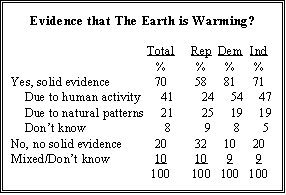 Americans generally agree that the earth is getting warmer, but there is less consensus about the cause of global warming or what should be done about it. Roughly four-in-ten (41%) believe human activity such as burning fossil fuels is causing global warming, but just as many say either that warming has been caused by natural patterns in the earth’s environment (21%), or that there is no solid evidence of global warming (20%).
Americans generally agree that the earth is getting warmer, but there is less consensus about the cause of global warming or what should be done about it. Roughly four-in-ten (41%) believe human activity such as burning fossil fuels is causing global warming, but just as many say either that warming has been caused by natural patterns in the earth’s environment (21%), or that there is no solid evidence of global warming (20%).
The public also is divided over the gravity of the problem. While 41% say global warming is a very serious problem, 33% see it as somewhat serious and roughly a quarter (24%) think it is either not too serious or not a problem at all. Consequently, the issue ranks as a relatively low public priority, well behind education, the economy, and the war in Iraq.
 The divided public attitudes toward global warming — and modest expressions of concern over the issue — distinguish the United States from other industrialized countries. Last month’s Pew Global Attitudes Project survey showed that only 19% of Americans expressed a great deal of personal concern about global warming. Among 15 countries surveyed, only the Chinese expressed a comparably low level of concern (20%).
The divided public attitudes toward global warming — and modest expressions of concern over the issue — distinguish the United States from other industrialized countries. Last month’s Pew Global Attitudes Project survey showed that only 19% of Americans expressed a great deal of personal concern about global warming. Among 15 countries surveyed, only the Chinese expressed a comparably low level of concern (20%).
The latest nationwide survey by the Pew Research Center for the People & the Press, conducted June 14-19 among 1,501 U.S. adults, finds that the public opinion about global warming is deeply polarized along political lines. Democrats are far more likely than Republicans to say there is solid evidence that temperatures are rising (by a margin of 81% to 58%), and that human activity is the root cause (by 54% to 24%). Democrats also place a far higher priority on the issue — believing it is a serious problem and rating it far higher in importance among issues facing the nation. For the most part, independents see global warming in the same way as Democrats in terms of whether there is solid evidence for the phenomenon and the importance of global warming relative to other issues.
Aside from these political divisions, however, there is little difference of opinion on global warming across other demographic and social lines. Men and women hold virtually identical beliefs about the issue, as do younger and older people, and those with more and less education.


